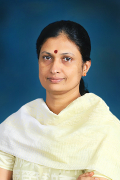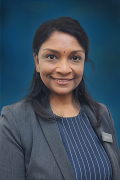- One-third of families of persons with Down Syndrome may prefer long-term care in the primary care setting. This includes supporting their emotional and physical needs and providing medical surveillance.
- The first Clinical Guideline for Management of Down Syndrome in Singapore provides recommendations for the screening, monitoring and management of health and care needs in persons with Down Syndrome, from child- to adulthood.
|
KKH and Sengkang General Hospital (SKH) have jointly launched Singapore’s first set of coordinated guidelines for community and tertiary health professionals, to standardise best practices in addressing the health and care needs of children and adults with Down Syndrome.
Down Syndrome is the most common genetic condition diagnosed worldwide, with a prevalence of about one in every 1,000 live births. This chromosomal disorder is usually diagnosed during pregnancy and at birth, and typically characterised by physical features such as weak muscle tone at birth, flat nose bridge, eyes that slant upwards and shorter-than-average stature.
One-third of families of individuals with Down Syndrome may prefer primary care support in the community as the individual grows older. Adults with Down Syndrome have multiple medical issues that develop at an earlier age compared to their peers without the condition. Hence, is important that community healthcare professionals are comfortable managing this cohort of patients, which includes supporting their emotional and physical needs, and providing medical surveillance.
Singapore’s first set of clinical guidelines for Down Syndrome management
The
Clinical Guideline for Management of Down Syndrome in Singapore details the health concerns and the recommended supervision and management by a physician, to provide families with anticipatory care for timely and holistic intervention. These include:
- Evaluating fractures for secondary causes including osteoporosis
- Monitoring for thyroid disorders – which occur in 20 per cent of individuals with Down Syndrome
- Screening and management for Type 2 Diabetes from 30 years of age
- Assessing the need for statin therapy for cardiovascular disease every five years from age 40
- Assessing dementia risks yearly from age 40 through observing baseline function in areas such as cognition, memory and motor skills
- Conduct eye checks once every two years in anticipation of issues such as cataracts
The majority of these health concerns can be managed by community healthcare professionals, with tertiary support where necessary. The Guidelines are also recommended to be shared with caregivers, to educate them on the necessary medical surveillance for their child and discuss anticipatory care with their attending physician.
The Down Syndrome Clinic at KK Women’s and Children’s Hospital (KKH) provides specialised, comprehensive care to the majority of children diagnosed with Down Syndrome in Singapore, from the antenatal period into early adulthood.
Refer a patient
Community healthcare professionals can also refer a child with Down Syndrome to the Down Syndrome Clinic at KKH for assessment and follow up via a written referral letter sent to
[email protected], with attention to the Neonatal Down Syndrome Follow Up Clinic. Further queries can be addressed to the same email address, or via the KKH GP Fast Track Appointment Hotline at +65 6692 2984.
|
Resources for community healthcare professionals and caregivers
|

|
Dr Amudha Jayanthi Anand, Senior Consultant, Department of Neonatology, KKH
Dr Amudha Jayanthi Anand’s clinical interests include birth defects, follow up of children with Down Syndrome and perinatal palliative care. Working closely with children with Down Syndrome since 2015 as a co-lead of the Down Syndrome Clinic at KKH, Dr Amudha is associated with a family from the point of diagnosis during the antenatal period, and continues to follow them after birth until their child is 18 years of age, when he or she transitions to care in the adult hospital setting.
Following the Membership exams in the United Kingdom and completion of her specialist training in paediatrics and neonatology in Singapore, Dr Amudha started her career in KKH in 2006. She is a member of the hospital’s Neonatal Ambulatory Committee, necrotising enterocolitis work group and bereavement support group.
She is also a Clinical Lecturer with the National University of Singapore’s (NUS) Yong Loo Lin School of Medicine and an Adjunct Assistant Professor, for Duke-NUS Medical School and Nanyang Technological University’s Lee Kong Chian School of Medicine.
Dr Amudha started her career in ultrasonology departments at referral centres of Tamil Nadu and New Delhi from 1989 to 1997, and subsequently worked as a registrar in neonatology in Kuwait and Saudi Arabia.
|

|
Dr Kavitha Sothirasan, Staff Physician, Department of Neonatology, KKH
Dr Kavitha Sothirasan has been co-leading the Down Syndrome Clinic at KKH since 2017, alongside Dr Amudha, which sees the majority of patients with this condition in Singapore. In 2022, she led the publication of the first Clinical Guideline for Management of Down Syndrome in Singapore, to provide structured guidance to the follow-up care plans of this patient group, backed by local data.
A prospective cohort study conducted by Dr Kavitha identified an SDQ (a standardised questionnaire) for the early identification of behavioural difficulties in children with Down Syndrome. Published in 2020, the tool is regularly used at the KKH Down Syndrome Clinic. Dr Kavitha also set up the Down Syndrome data base in Singapore, to capture patient data for research and improvement in the quality of care.
Alongside Dr Amudha, Dr Kavitha believes that improving the quality of care and empowering caregivers with knowledge are important aspects in their management. Believing that “Love Doesn’t Count Chromosomes” and “Every child has his/her own potential that is awaiting to be unlocked!”, guide their approach in the outpatient clinic.
Dr Kavitha completed her specialist training paediatrics in Singapore and received her postgraduate qualification of Master of Medicine from NUS, Singapore, and Membership of the Royal College of Paediatrics and Child Health (MRCPCH), United Kingdom in 2015. She is also Senior Clinical Lecturer at the NUS Yong Loo Lin School of Medicine.
|

